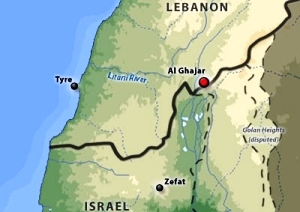 Israeli Ministers on Wednesday approved the withdrawal of Israeli troops from the northern half of Ghajar, a divided town that straddles the Lebanese border, according to Israeli newspaper Haaretz,
Israeli Ministers on Wednesday approved the withdrawal of Israeli troops from the northern half of Ghajar, a divided town that straddles the Lebanese border, according to Israeli newspaper Haaretz,
The unilateral pullout will reportedly take place without any coordination with Lebanon, still technically at war with Israel.
In Wednesday’s vote, the security cabinet ordered the foreign ministry to coordinate a withdrawal date with UNIFIL, the United Nations force deployed across southern Lebanon, within 30 days, Haaretz reported.
After a date is agreed, the cabinet will vote again to give final approval for the redeployment of Israeli troops.
According to a plan proposed by UNIFIL’s commander, General Alberto Asarta Cuevas, the Israel Defense Forces will withdraw completely from the northern, Lebanese half of the town to comply with UN Security Council Resolution 1701, passed following Israel’s month-long invasion of Lebanon in 2006.
Under the scheme, neither Israel nor Lebanon will control security in northern Ghajar, with UNIFIL working to control access to the town from the Lebanese side.
About Ghajar
Most residents of Ghajar belong to the Alawi sect, an offshoot of Shia Islam, whose adherents include Syrian President Bashar al-Assad and the Syrian political elite.
Residents of Ghajar are reportedly angered over the prospect of the community being split.
Together with the Golan Heights, the southern half of Ghajar was taken by Israel in the 1967 Six Day War with Syria. After Israel annexed the Golan in 1981, Ghajar fell under official Israeli jurisdiction and most of its residents have accepted Israeli citizenship.
Over the years, the village expanded northwards into Israeli-controlled southern Lebanon, incorporating the Lebanese village of Wazzani. The UN demarcated the Israeli-Lebanese border following Israel’s withdrawal from southern Lebanon in 2000, granting Lebanon control of the northern section of Ghajar. However, Israel re-took the entire village following its war with Hezbollah in 2006.
Nasser Moustafa, a resident of Ghajar, told The Media Line last week that he felt more Syrian than Lebanese :
“We have brothers in Syria,” he said. “In the past, we used to serve in the Syrian army, not the Lebanese army. How can one suggest we live in Lebanon with Hezbollah and all the other militias?”
Ghajar residents protest division
Ghajar residents continued to express fervent opposition to the move, holding a protest attended by some 400 people who vowed to prevent UN forces from entering the village.
“The entrance of UN forces to the northern part of Ghajar means effectively splitting the village in two,” said council spokesman Najib Khatib.
“This is why we will not agree. We demand that the village remain whole and that the debate on it be part of a peace agreement with Syria stipulating the return of the Golan Heights. Ghajar is part of Syria and we have no connection to Lebanon… We demand retention of the status-quo.”
Khatib Hussein, a resident of the village’s northern part, is an outspoken objector. “How do they want to divide a village of 2,000 people? Will they run a fence through the middle? A checkpoint? All of the infrastructure here is united: There is one school, and my children study in the south,” he said.
There were more aggressive objectors, such as Khatib Gamal, who lives in the south. “I have lived under Israel since 1967. I was a Syrian citizen, and stayed because of my land. We have close to 12,000 dunum (about 3,000 acres) and no one will move us. Who are these UN and America? They should leave us in peace,” he said.
Israeli ploy
Reacting to Israeli decision to withdraw from northern Ghajar Amal MP Qassem Hashem said on Wednesday that “the decision to withdraw is an Israeli ploy that is aimed at improving Israel’s distorted image in Palestine and help the country evade its international obligations.”
Amal is closely linked to the Iranian and Syrian backed Hezbollah militant group
“If this withdrawal takes place , it would be an implementation of UN Security Council Resolution 1701 and international legitimacy,” Hashem said, according to local reports and added that “if Ghajar is handed to the UN, it will still be occupied.”
Hashem also called for efforts on Ghajar to continue “until the Lebanese Armed Forces (LAF) enter the village and extend Lebanese sovereignty.”

Leave a Reply
You must be logged in to post a comment.